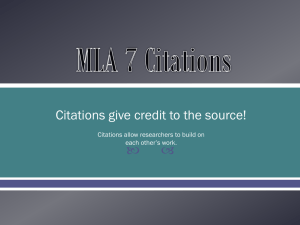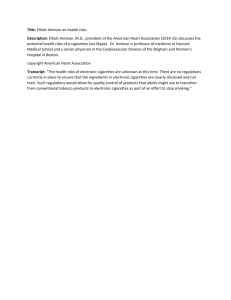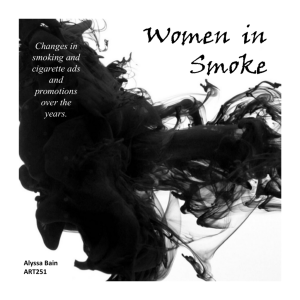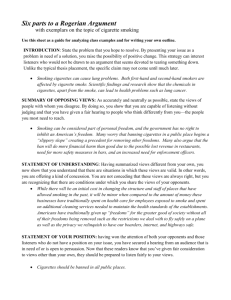A Virtual Arm to Stop Smoking
advertisement
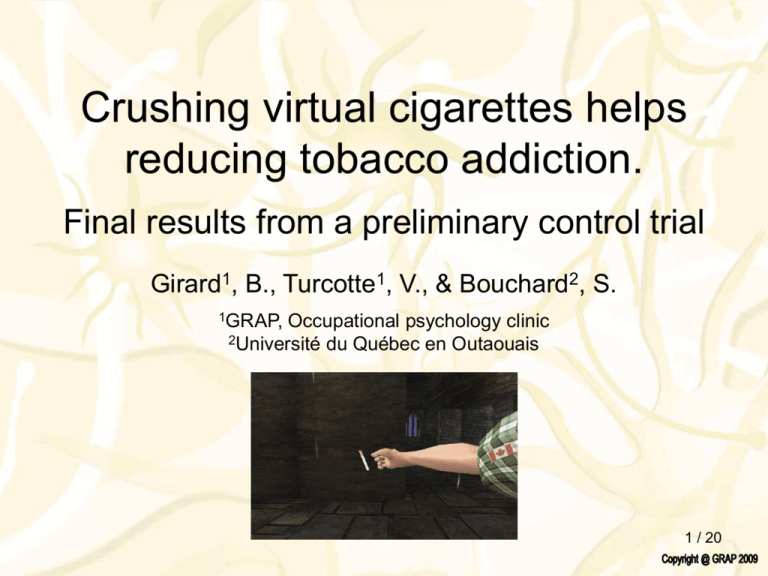
Crushing virtual cigarettes helps reducing tobacco addiction. Final results from a preliminary control trial Girard1, B., Turcotte1, V., & Bouchard2, S. 1GRAP, Occupational psychology clinic 2Université du Québec en Outaouais 1 / 20 PILOT STUDY 2007 OBSERVATIONS: 1. Some clinical indications of modifying craving and smoking behaviours. 2. An action-cue exposure (ACET) strategy could be considered in the treatment of substance addiction. 2 / 20 COMPARATIVE STUDY 2008 • Objective of the current study: – Test the advantages of adding to a psychosocial smoking cessation treatment program for adults four (4) sessions of immersion in virtual reality where the patient uses a virtual arm to crush cigarettes. • Hypothesis: – Compared to the placebo condition, crushing virtual cigarettes will lead to: • Better reduction in tobacco addiction • Better abstinence • Better retention in the program 3 / 20 DESIGN • 91 subjects randomly assigned • Combined therapy (no medication): psychosocial support + crushing virtual cigarettes psychosocial support + grasping virtual balls • No target quit date • Study has been approved by the Research Ethics Board of UQO • “Internal funding” 4 / 20 PRESELECTION (telephone) • Recruitment through local medias • Inclusion criteria : Age between 18 – 65 Daily smoking 10 cigarettes and more (last year) Fewer than 3 months abstinence (last year) Desire to stop smoking • Exclusion criteria : Any serious or unstable disease (6 months) Treatment for major mental illness (last year) Use of medication to stop smoking (6 months) Regular use of CNS medication Treatment with “cybertherapy” (last year) History of severe substance abuse (last year) Pregnancy 5 / 20 SELECTION (clinic visit) • Physical data : • Smoking history : • • • • • vital signs body mass index age duration number of attempts abstinence periods mean daily use Exhaled CO test Questionnaires VR adaptation session (10 min.) and tests Informed consent document Randomization 6 / 20 INTERVENTION (1) Psychosocial support • Brief individual counselling (10-15 min) by a nurse : assist in problem solving, give information on withdrawal, analyse smoker’s journal. • Smoking cessation self-help booklet : Guide to becoming a non smoker (Health Canada 2003). • Exhaled CO test, vital signs and body mass index. • Complete questionnaires. • Frequency of visits : - weekly for 1 to 4th week - biweekly for 6th to 12th week • Medical counselling (if necessary) 7 / 20 INTERVENTION (2) Immersion in virtual reality (all participants) • Four weekly sessions : week 1 to 4th • Time : 30 min. • VR scenario, while exploring a castle either: – Grasping up to 50 virtual balls (placebo ctrl) – Crushing up to 50 virtual cigarettes • Complete questionnaires • Wait time after the immersion before leaving the office : 10-15 min. 8 / 20 EQUIPMENT • Pentium IV with nVidia 7300GS stereo video card • eMagin z800 HMD • Logitech wireless gamepad • XSI from Softimage was used for the virtual arm and environment’s creation • 3D work was integrated into a well-know game engine called Unreal 2™ from Unreal Tournament 2004™. 9 / 20 Video 10 / 20 Measures : (each visit at the clinic) Outcome • Addiction: – Fagerström test for nicotine dependence (Heatherton, 1991) • Smoking status: – Daily self report journal – Exhaled CO test (cut-off at 6 ppm). • Drop out rate: – Stopping the program, no matter the reason… Process / side effects • Presence Questionnaire (PQ; Witmer & Singer, 1998). • Simulator Sickness Questionnaire (SSQ; Kennedy et al., 1993). 11 / 20 RESULTS Descriptive characteristics: • n = 45 in the control condition (Balls) • n = 46 in the experimental condition (Cigarettes) • Average age: 44 years (SD = 11 years) • Had been smoking for an 27 years (SD = 12 years). • Gender: 57% female. • Work status: 68% employed. • Smoking frequency: 45 % smoked more than 21 cigarettes a day. 12 / 20 Results (intent-to-treat) Fagerström test 10 9 8 7 6 5 4 3 2 1 0 Week 1 (pre) Week 4 (post VR) Balls Week12 (post) Cigarettes ANOVA : Time [F(2,178) = 33.07, p < .001)] Condition [(F(1,89) = 4.69, p < .025] Time/Condition interaction [F(2,178) = 3.75, p < .05] Interaction contrast : p < .01 at W4 / W12 13 / 20 Results (intent-to-treat) Abstinence (confirmed by CO test) 16 14 12 10 8 6 4 2 0 Week 1 (pre) Week 4 (post VR) Balls On a phone call 6-month post-Rx: Cigarettes: 39% abstinent Balls: 20 % abstinent Week 12 (post) Cigarettes χ2 (1) = 1.84, ns χ2 (1) = 4.79, p < .05 14 / 20 Retention rate in the program Number of patients in the program A significantly different retention profile [Gehan's Wilcoxon test (1) = 6.96, p < .01]. 50 45 40 35 30 Balls 25 Cigarettes 20 15 10 5 0 1 2 3 4 6 8 10 12 Weeks Significantly more controls had dropped-out of treatment: at week 4 [22% vs 49%, χ2 (1) = 7.35, p < .001] at week 12 [50% vs 71%, χ2 (1) = 4.24, p < .05]. 15 / 20 Process and side effects • A multiple regression with PQ predicting change on the Fagerström was significant [F(2,90) = 39.78, p < .001] and showed that presence contributes significantly to changes in scores measuring tobacco addiction (sr2 = .18, p < .025). • Cybersickness : [F (1,57) = 4.10, p < .05] Week 1 Week 2 Week 3 Week 4 Grasping virtual balls condition Mean (SD) Crushing virtual cigarettes condition Mean (SD) 39.39 (48.72) 41.62 (42.45) 41.77 (44.01) 28.67 (41.47) 81.93 (70.11) 58.91 (55.57) 51.91 (45.53) 51.24 (62.55) 16 / 20 Conclusion • Crushing virtual cigarettes had a significant effect on: – Fagerström (addiction) – Abstinence (confirmed by CO tests) – Drop-out (retention) • Why ? – Staying longer in the treatment… • Ok, but again, why? – Self-efficacy to crush burning cigarettes ? – Motivation to crush, to quit, enjoy crushing, stages of change ? – Practicing an automatic response ? • Action cue exposure ? – New association with positive mood and smoking cessation ? • Seeing cigarettes is no longer associated with frustration… • More research is clearly needed … 17 / 20 18 / 20
